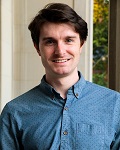2020
Adam C. Matthews
- Doctoral Candidate
- Columbia University

Abstract
Through an examination of legal practices between 850 and 1100, “Law, Liturgy, and Sacred Space in Medieval Catalonia” shows how communities in northeastern Spain, lacking the stabilizing influence of a state, were able to craft successful dispute resolution strategies and worked to prevent the emergence of abusive power hierarchies. Following the eighth-century collapse of the Visigothic kingdom, many litigants challenged the legitimacy of the court system. This project reveals how judges responded by drawing on an emerging theological distinction between mundane and supernatural spaces and the belief that churches were gateways to Heaven in order to resolve conflicts. At the height of protracted trials, judges brought litigants to sanctuaries, and there, under the discerning gaze of the church’s saintly denizens, compelled them to swear to uphold rulings. Thus, in lieu of central control, appeals to a common belief in supernatural forces permeating sacred spaces helped to maintain order.

